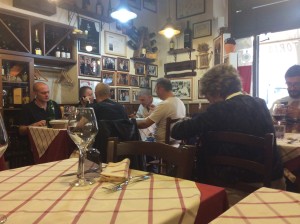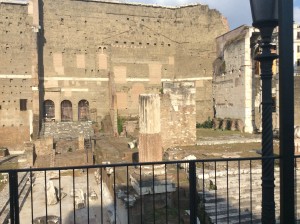Dear Donne,
As I approach the last 48 hours of my month here in Rome, I’ve decided that I can’t hold back any longer, and I want to give you a piece of unsolicited advice from someone who only has your best interests at heart. Really, I swear.
After all, I DID marry an Italian woman, who gave me a beautiful half-Italian daughter, but while the mother of my daughter DID do the thing that I’ve noticed, thankfully my daughter did not.
So, here goes:
At first I thought it might be just the area of the city I’m staying in, although there’s no good reason for thinking that, but as the days turned into weeks, I finally determined that this is a trend that seems to be disturbingly frequent.
What I noticed was that there were these gorgeous women, but the guy they were with were….not so gorgeous, I guess is the nicest way to put it. No, in fact, they were what TLC called “scrubs”.
Short, bald, dumpy, sometimes all at once; the best way to describe it is that the men here are hitting WAY above their weight. Or put another way, dating above their pay grade. However you put it, I’ve seen this too often for it to be a coincidence and not to be a big trend.
And when I discreetly asked around, I think I’ve discovered what’s going on, and for this I blame the Catholic Church.
But even now, more so than in the States, women are encouraged to grab onto a man, quick. And I think what’s happening is that a lot of Italian women are settling for the first train that pulls into the station, rather than waiting for the one that will take them to the destination they really want.
Seriously, ladies. I know that Italian guys live with their moms until they get married, so if you were to use that as a disqualification like women do in the States, there would be nobody left. But at the same time, believe it or not, there are a lot more men out there who will in all likelihood be a better fit for you. Someone who is actually on your level. Not male model, but, as we say in Texas, “clean up good.”
I mentioned that my first ex-wife did this, marrying her high school sweetheart. But, although the marriage didn’t work out, I thank GOD that she did what appears to be in y’all’s DNA, since she was born in Texas and grab onto the first train.
The funny thing is that one of the few things she and I agreed on was insisting that our daughter wait and not get married right out of high school, and fortunately she listened.
But here’s the bitter truth, donne. Who you are at 19 and who you’re going to be at 30 will rarely resemble each other in a lot of ways, at least the ways that matter. So that’s one factor, but the other is that neither will Luigi, or Enzo, or whoever. And we men, especially when we’re young, have a REALLY bad habit of taking the women in our lives for granted, and I would be willing to bet that, if y’all were honest, that’s even more true here in Italy. And look it from our viewpoint; why SHOULDN’T we take you for granted? I mean, when you’re the first and only, that’s a pretty strong strategic position to be in.
I mean, do you REALLY want to spend your life with someone who never did a load of laundry, or doesn’t even know how to boil water? And, believe it or not, there are men out there who can not only do both, but they can balance a checkbook, and put the toilet seat down. I know, I know; now you’re saying “Okay, THAT is a lie.” But it’s true, I swear.
The point is that you’re really selling yourselves short here. And that’s just a shame. Because, donne of Italy, you have got it goin’ ON! I can’t count the number of times I’ve had to stop and just say, “…..DAMN….” before continuing on my way.
Too bad that it’s going to be wasted on the first guy who ever took the time to get to know you.

